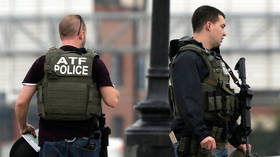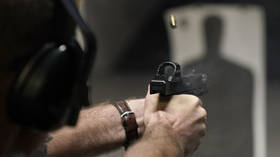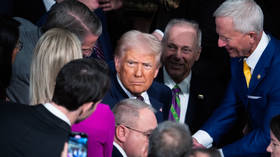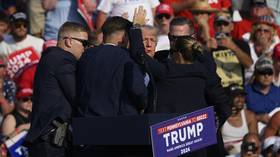US government warned against warrantless ‘gun checks’

US Senator Joni Ernst (R-Iowa) has demanded to see legal justification for the growing number of ‘knock and talk’ visits to lawful gun owners by the Bureau of Alcohol, Tobacco, and Firearms (ATF).
In a letter written Tuesday to Attorney General Merrick Garland and reported on by Breitbart, Ernst laid out eight questions about the program, which according to Garland is aimed at uncovering ‘straw purchases’ – cases in which a person legally barred from buying a gun uses someone with a clean record to purchase it for them.
Videos have surfaced on social media showing well-armed and -armored ATF agents visiting the homes of individuals who – according to federal records – recently bought a gun, demanding to see the weapon and confirm they haven’t passed it off to someone else. The individual is expected to either go inside and retrieve the weapon or to invite the agents in – both moves any attorney would advise against.
Ernst asked Garland what constituted probable cause for these visits and whether agents sought a warrant before turning up on the target’s doorstep, expressing concern about what procedures were in place to protect their Fourth Amendment right against unwarranted search and seizure. She also questioned whether any guidelines existed for what time of day agents could conduct their inquiries and whether they were required to wear uniforms identifying them as ATF.
Asking whether sending federal agents to Americans’ homes just to make sure they’re following the rules “was not in fact meant to harass or coerce firearm purchasers into, at best, legally questionable investigations,” she questioned whether the agency alerted local law enforcement to their activities – a reasonable precaution if the agents did believe their target was armed and/or dangerous. She also demanded to know how many of the visits the ATF had conducted since Garland announced the straw buyer enforcement initiative last month.
A Delaware gun owner who was visited by the ATF in the days before Garland’s announcement posted video of the “embarrassing” raid to social media, describing how “confused” he was at being ordered into his home to retrieve a rifle he’d recently bought. While he complied because he “didn’t want to end up on a watch list,” he said he “felt like they were invading my privacy.”
An ATF agent showed up at a citizen's home to question him about a shotgun he was not "permitted" to have.The citizen called 911 and told them someone was at his door trying to take his guns.Police end up ARRESTING the ATF agent.pic.twitter.com/D7kMW0kkIl
— Young Americans for Liberty (@YALiberty) August 4, 2022
A gun owner in Columbus, Ohio was more resourceful. When agents demanded to confiscate a shotgun allegedly located in the home but could not produce a warrant, the homeowner called local police, reporting someone was impersonating a federal agent and trying to take his guns. Cops showed up and promptly arrested the ATF agent, who is now suing the police for “excessive use of force.”














